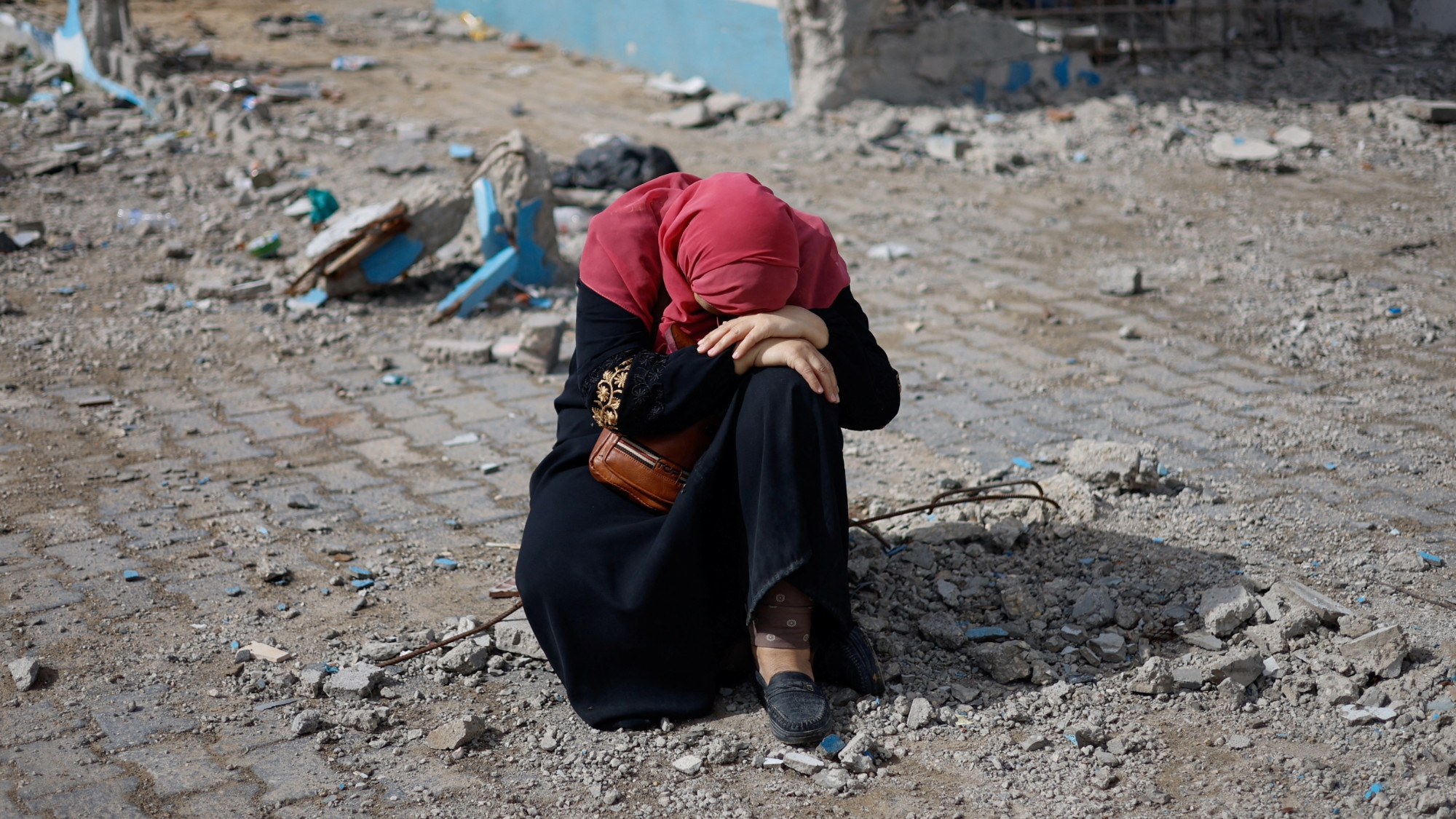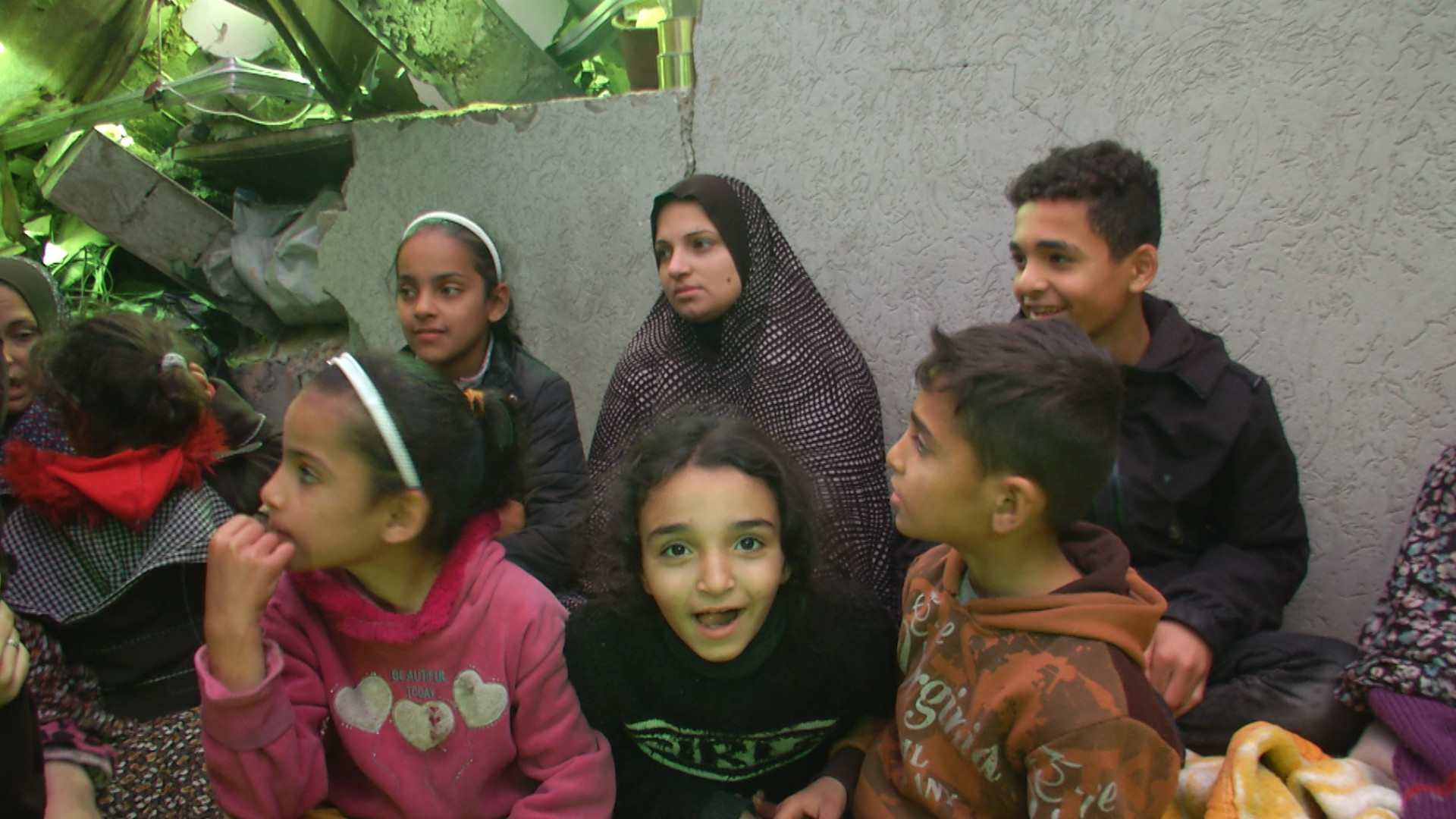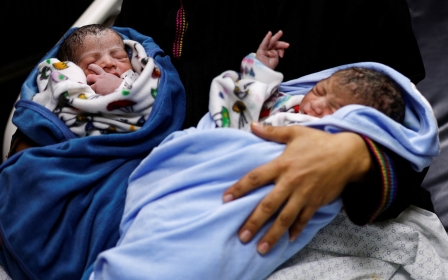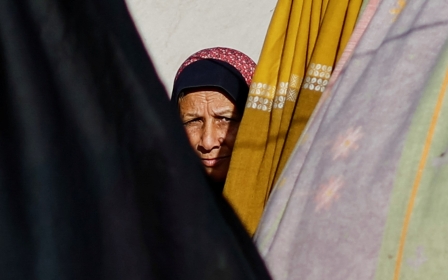War on Gaza: 'My unborn baby was dead before I even knew the gender'

As bombs rained down and the Israeli army forced Palestinians to flee, Shireen Abu Daher resisted leaving her home in the northern Gaza Strip. She feared the long walk to the south would harm the unborn baby she was pregnant with. But as Israeli attacks grew more intense, she was eventually forced to flee south. Here, she recounts to Middle East Eye the deadly five-hour journey, during which her worst fears came true.
The following account was told to Hala Alsafadi
My name is Shireen Abu Daher, 40, a Palestinian mother of three from Gaza.
I used to live in the Jabalia refugee camp, north of Gaza City, an area that came under intense Israeli bombardment since the start of the onslaught on 7 October.
During the attacks, our neighbourhood was bombed and our house was destroyed. My parents and siblings had already left Jabalia and fled to a school in Rafah.
New MEE newsletter: Jerusalem Dispatch
Sign up to get the latest insights and analysis on Israel-Palestine, alongside Turkey Unpacked and other MEE newsletters
At first, I avoided taking this journey because I was in my third month of pregnancy. I knew it was extremely long and dangerous. I did not think it would be a good choice, but I had no choice.
We decided, in the end, that we would go there with a big group of people.
I packed two knapsacks for myself and my children back in December, along with some snacks and water for the journey.
I left not knowing whether I would ever be able to come back, or if my unborn baby would ever know how our neighbourhood and house looked like. I put my emotions aside and fled unaware what was waiting for me on the other side of the Gaza Strip.
Endless walk
The walk seemed endless. It felt like we were not in Gaza any more. Nothing looked recognisable. We were walking in a wasteland with snipers, tanks, and soldiers all around amid the mass destruction.
Since I have a prosthetic knee and I was pregnant, I could not catch up with the rest. I had to stop every hour to rest, which made the journey altogether even harder for me and my children.
When we reached the Israel-erected checkpoint along the route, it beeped as I passed it.
I knew it was because of my prosthetic knee and that’s what I told the soldiers, but they did not care.
They ordered me to walk up where other soldiers were standing on top of a hill. They let me take only my youngest daughter, who is three years old.
My other children, scared to continue without me, started crying. As I walked up the hill, the soldiers shouted at them to move and not wait. I couldn’t do anything as a sniper was stationed right next to me.
The soldiers ordered me to leave everything I carried and keep my hands up. I left the knapsacks I packed, and they took my phone away. I had no water, food, or any way to contact my family or children.
As the sniper was pointing his gun at us, the soldiers gave their orders: “Walk straight, turn right, turn left, stop, walk, don’t turn, keep your hands up.”
Fatal climb
As I was left there waiting, it started to rain.
Then I was ordered to climb up a sand berm they set up, which led to a higher bit of land where more soldiers were standing.
As I was going up, I fell. I felt some warm blood coming down my legs, but I was too scared to check or say anything.
'I thought of my unborn baby. Was this it for the baby? It was dead before I even knew the gender'
- Shireen Abu Daher, Palestinian woman
I kept bleeding whilst walking up the hill. Once I reached them, they told me to wait again.
I stood there for another half an hour while I was bleeding. At this point, everyone could see me covered in blood.
The soldiers were searching people and ordering some to take off their clothes. I was terrified that they would ask me to do the same.
I saw them looking at me, talking to each other, and taking pictures of me.
I was extremely embarrassed. I felt so powerless that I could not ask them to stop or say I needed to be seen by a doctor.
I felt as if this very cruel world was collapsing around me.
I thought of my unborn baby. Was this it for the baby? It was dead before I even knew the gender.
I also thought of my little daughter who was with me, witnessing how weak and scared her mother was.
I was also thinking of my two boys who had to flee without me. Did they find someone to walk with? Are they still crying? Did any of them get shot?
Crying and bleeding
After a while, an Israeli soldier told me I can go back to the normal route to Rafah.
I went down the hill crying and bleeding.
I kept walking as fast as I could to look for my children. They were crying while waiting for me after they crossed the checkpoint.
The phone they had was also taken away from them.
Once I saw them, my body collapsed. I was bleeding heavily and could barely move.
The children were terrified when they saw me covered in blood. They thought I was shot, and I was dying.
An old man on a donkey-drawn cart saw me and felt sorry for me. He offered to take me to a safe place where my brother could pick me up by car.
'My baby would have been alive if I never had to take that deadly journey'
- Shireen Abu Daher
I used his phone and called my brother, who then waited for us in the Nuseirat refugee camp in the centre of the Gaza Strip.
My brother took us to the school where they had been sheltering before an ambulance took me from there to the Emirati hospital.
I lost so much blood and my body was too weak. I lost my unborn baby.
I look back at what happened to me and I am traumatised, and so are my children.
We should not have to live this way.
My baby would have been alive if I never had to take that deadly journey.
Editor's note: The account was edited for brevity and clarity.
This article is available in French on Middle East Eye French edition.
Middle East Eye delivers independent and unrivalled coverage and analysis of the Middle East, North Africa and beyond. To learn more about republishing this content and the associated fees, please fill out this form. More about MEE can be found here.





